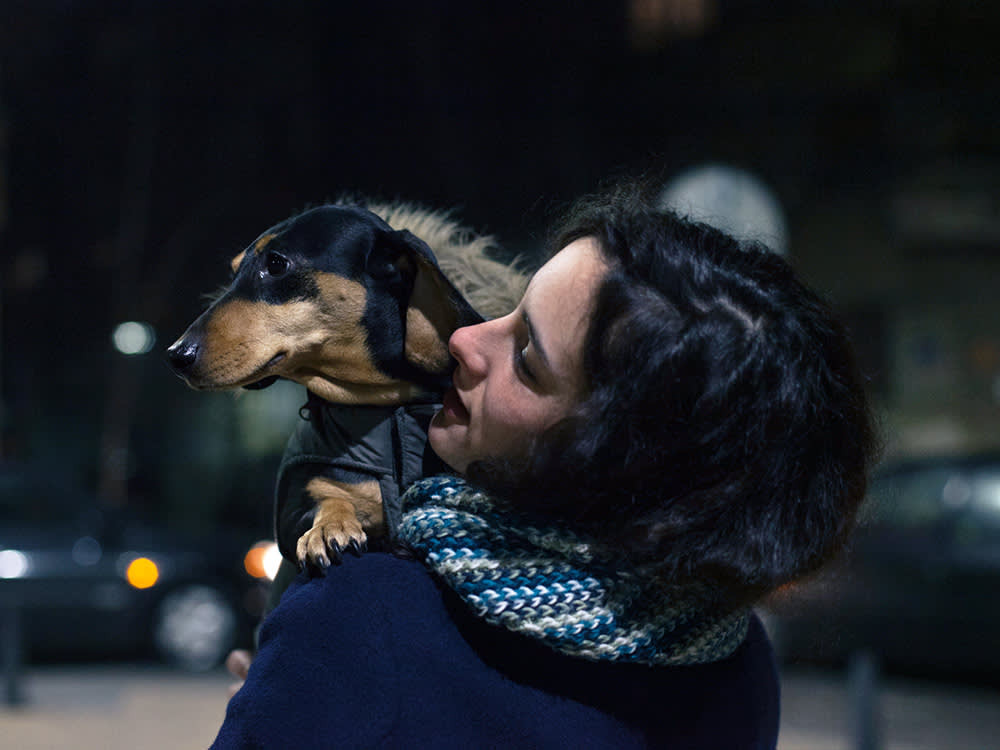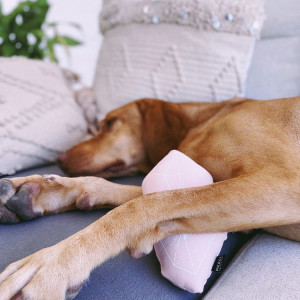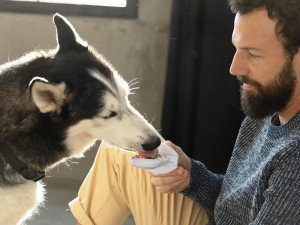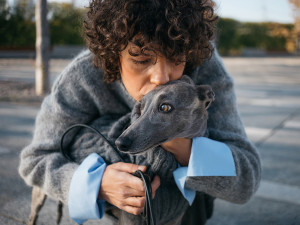How Do I Know If My Dog Is Afraid of the Dark?
If your dog is reluctant to go outside in the evening (or 4pm as it’s known in winter), there might be a good reason
As winter darkness creeps in, your dog may be less inclined to go outside when the sun goes down. It may be a coincidence or down to the change in weather, but you may ask yourself, can dogs be afraid of the dark?
It’s a question I pondered when I noticed a change in my dog’s behaviouropens in new tab as the seasons changed. Our usual post-work walks now required a light-up collar, and my previously happy and bouncy cocker spaniel seemed jumpy and reactive at night. She would bark at noises that didn’t bother her during daylight hours like the rustling of leaves and bikes whizzing past. Almost as soon as she left the house, she’d start pulling towards home, signalling the walk was over.
Get (totally free) deals for food, treats, accessories, tech and way more pet parenting must-haves.
Trying to get long walks during daylight hours is hard in the winter when juggling work. I didn’t want to put her in a situation that scared her, but not going out in the dark wasn’t an option.
I wondered if darkness was the issue or if something else was at play. Clinical Animal Behaviourist Emily Birchopens in new tab says that while anxiety around dark is possible, “Dogs don’t fear darkness as humans do. That isn’t to say, though, that you don’t see dogs who appear to fear the dark. However, this is more about them being in a negative affective state as a result of prior experiences than true fear of darkness.” We asked our expert how to know if your dog is anxious about the dark, the causes and how to help them.
How to know if your dog is scared of the dark
If you think your dog might be afraid of the dark, they may hide or cower when they see you getting ready to go out at night. When they get outside and see that it’s dark, they may exhibit other fear-based responses such as trembling, pacing, panting, drooling, and aggression. Birch says, “If these responses consistently happen at the onset of darkness, then it is worth exploring what else is making them scared. Because it is highly unlikely to be the darkness itself that is causing the worry.”
What causes a dog to be afraid of the dark?
Have you noticed that when you take your dog out at night, they sense objects and other animals more quickly than you do? Dogs can see movement and light in the dark better than humans can, assisted by the high number of light-sensitive rods within the retina of their eyes. Rods gather dim light, which enables better night vision. This means that dogs aren’t worried about something being there that they can’t see, and fear of going out at night has nothing to do with the darkness itself.
Birch says that dogs like to generalise previous experiences, and when something negative happens to them in the dark, they may associate the dark with something negative. “As a clinical animal behaviourist, I see this a lot with dogs who fear fireworks. It is not uncommon for them to be fine with bangs and loud noises during the day but absolutely petrified of any bang in the night. For them, fireworks and darkness go hand in hand. Also, if your dog was frightened or attacked when it was dark, they may associate the dark with that event and show fear-based behaviour at night-time.”
If you have a rescue dog and notice they seem afraid of the dark, the answer may exist in your dog’s past, and you may never know what happened. It could be that they were separated from their canine family at a young age or were left for long periods of time in a dark space.
How can I help my dog if they’re afraid of the dark?
Finding the triggers for your dog’s anxiety around the dark can be helpful. Birch encourages you to get curious about finding out the root cause of the night-time anxiety. What else is happening around the time of your evening walks? Are there noises or nocturnal animals you don’t encounter during the day? Changing your routine so the bulk of walks take place during daylight hours and sticking to well-lit streets can help, along with a head torch to lighten your dog's path.
Birch says that your reaction to being outside in the dark can play a part. “Spend some time with your dog in the dark and reassure them. Dogs are very perceptive and pick up on their owner’s emotions and feelings. If you are calm in the dark, your dog will probably feel the same way.”
Birch also recommends avoiding purchasing anything that offers a quick fix – as it takes time for a dog to overcome any fear. “Adpatil calming products have some robust science behind them and I know dogs who are transformed by Thundershirts and TTouch wrapping but these often aren’t a cure-all.”
If night walks are a source of stress, take it slowly and give your dog comfort and treats to make the experience less scary. Birch says patience and affection can help your dog overcome their fear. “You cannot reinforce an emotion. A behaviour, yes, but not an emotion. If your dog is frightened and comes to you for a cuddle and some support, then stroking them, telling them they’re OK and being near them will help them feel less worried.”
If the fear is causing aggression in your dog, then it may be time to contact a professional. Birch recommends consulting a clinical animal behaviourist, who should be able to identify the source of your dog’s fear and devise an attack plan. “They can work with you on a desensitisation and counterconditioning programme potentially alongside medication if they’re really frightened.”






